Stephanie Ware, MD, PhD, was one of those kids who genuinely liked school—social studies, science, language, math, you name it.
It’s not surprising she graduated summa cum laude from Butler University, then followed that by earning two doctoral degrees, or that she’s now chair of the Department of Medical and Molecular Genetics and leader of the Cardiovascular Genetics program at the Herman B Wells Center for Pediatric Research at Indiana University School of Medicine.
“People who become MD/PhDs are interested in a lot of different things—research plus clinical care,” Ware said. “It was a hard decision for me whether to become a pediatric cardiologist or a geneticist. I discovered I could combine what I enjoy about both.”
Ware’s NIH-funded research laboratory has made significant discoveries in the areas of congenital heart defects and function.
“Dr. Ware is nationally recognized for her research program in cardiovascular genetics,” said Tatiana Foroud, PhD, executive associate dean for research affairs at IU School of Medicine. “Her research is clearly aligned with our school’s research goals of both advancing basic research and also translating basic discovery to improve clinical care.”
Ware now leads a growing department of genetics experts in bioinformatics, neuroscience, musculoskeletal biology, cancer and more.
“Not every medical school has a freestanding department of genetics, and among those that do, not all of them have clinical genetics and clinical laboratories,” Ware said. “That makes us a powerhouse.”
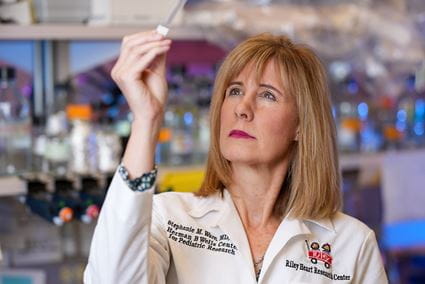 Being a woman in genetics
Being a woman in genetics
Until Foroud asked Ware to become vice chair of clinical affairs with the Department of Medical and Molecular Genetics in 2017, Ware had never reported to a woman in the entirety of her career.
“It was very refreshing to me that there were a lot of women leaders at IU,” said Ware, who assumed the chair role from Foroud earlier this year. “I’ve been here almost 10 years now, and it’s been a wonderful place to work and develop skills as a leader.”
Over the last five years, Ware has transformed the department’s clinical program while running her own active research laboratory, Foroud said, making her “an ideal chair to lead the department as genomic medicine is more broadly implemented at IU Health and to grow the research portfolio of the department to meet the ambitious goals of the IU School of Medicine Strategic Plan.”
Ware was first recruited to IU in 2014 by Wade Clapp, MD, chair of the Department of Pediatrics, to start up the Cardiovascular Genetics program within the Wells Center—the department’s basic research arm.
“Dr. Ware is an experienced clinical and laboratory-based physician scientist who has led multi-site initiatives to identify the genetic causes and clinical features of cardiac malformations,” Clapp said. “She has been a strong collaborator with pediatric cardiology, neonatology and other divisions in driving innovation in genomic medicine and in training the next generation of physician-scientists.”
Ware considers Clapp and Foroud models of both excellent science and leadership. As another woman in genetics, Foroud leads IU’s national biobank for Alzheimer’s samples.
“They are both very good at mentoring people—not to be just like them—but they help people find their own path to develop their own strengths and skills,” Ware said.
Many would say the same of Ware.
“She is able to see potential in people—even those who may not see it in themselves—and help give them achievable challenges to move forward,” said Elle Geddes, MD, who joined Ware in the cardiovascular genetics program in 2019.
She first reached out to Ware nearly a decade earlier while studying genetics at the Medical College of Wisconsin.
“I've learned so much by reading her papers and studies, and this has imprinted as part of my professional development for my approach to my own ideas and studies,” said Geddes, now an associate professor of clinical medical and molecular genetics. “I still have so much more I can learn from her, too, which is the primary reason I moved to IU.”
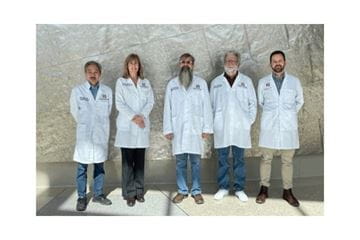 While there are other female clinical department chairs at IU, Ware is the only woman among the basic science chairs (genetics spans both realms). She’s also the only female primary investigator leading a cardiac-related group at the Wells Center and is currently co-leading research—with four male investigators—on a $13 million grant from the National Heart, Lung and Blood Institute aimed at understanding the development of congenital heart defects.
While there are other female clinical department chairs at IU, Ware is the only woman among the basic science chairs (genetics spans both realms). She’s also the only female primary investigator leading a cardiac-related group at the Wells Center and is currently co-leading research—with four male investigators—on a $13 million grant from the National Heart, Lung and Blood Institute aimed at understanding the development of congenital heart defects.
Ware didn’t think much about the significance of being a woman in her early career. She was focused on securing grant funding and getting her lab up and running, just like anyone else starting out as a medical scientist.
“I felt it more in mid-career,” Ware said, “when you’ve been successful and want to expand into leadership and have a wider scope of influence.”
Often, Ware finds herself the only woman in the room. She’s not one to be intimidated.
“As a woman leader, there can be a finer line to walk in terms of how you’re perceived,” Ware said. “Being overly direct or overly driven and ambitious can be viewed as a negative trait for a female but highly valued when males exhibit those personality traits. I think that’s changing, but it’s slow.”
‘Do what you love.’
A kid “from all over,” Ware lived in nine places by the age of 13, including overseas. One of those places was Indianapolis, where she returned to attend Butler University as a collegiate athlete in basketball. Ware was interested in many academic fields, but she finally settled on zoology, the scientific study of animal life.
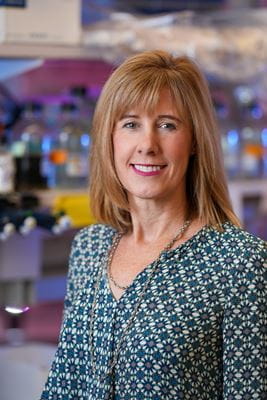 Surprisingly, she “wasn’t a huge fan” of lab courses.
Surprisingly, she “wasn’t a huge fan” of lab courses.
“They’re sort of cookbook—show up and follow a recipe to do the experiment,” Ware said. “What I like about science is being able to discover new things and think about questions that need to be answered. Science is methodical and analytical, but it’s also creative. There are multiple approaches to answering a question, and you get to decide how to design that.”
After entering medical school at the University of Cincinnati, Ware connected with the leader of Cincinnati’s physician scientist training program—a woman—who has remained a mentor throughout Ware’s career.
“The last year of my thesis research, I started doing a little bit of developmental biology and found it fascinating to learn about how the heart formed,” said Ware, who went on to complete her pediatrics residency and a clinical genetics fellowship at Baylor College of Medicine in Houston. “That interest has carried over into my current research and career.”
Ware is the only person in her family in a scientific or medical field. She and her spouse have two adult children—one a graduate of IU Kelley School of Business and the other a graduate of the IU Jacobs School of Music. Ware encouraged them to forge their own paths, as did she, and “do what you love.”
When her family and her scientific career were both young and growing concurrently, time management was challenging.
“The advice given to me as a grad student was to wait to have children until you have tenure,” Ware recalled. “That’s not great advice for someone pursuing an MD/PhD when you don’t finish until close to 30 and then have residency, fellowships, your first academic appointment and the tenure process.”
Ware thinks better advice is, “Be present where you are. When you’re at home, make the most of that time with your family.”
At work, Ware is focused on different tasks throughout the week. When she’s in the clinic, she is present with a family struggling to understand and manage their child’s genetic heart condition. When she’s in the lab, Ware is focused on understanding genetic and developmental pathways for pediatric heart diseases. As an administrator, Ware focuses on new opportunities for her department and its emerging leaders.
Knowledge sharing is top priority
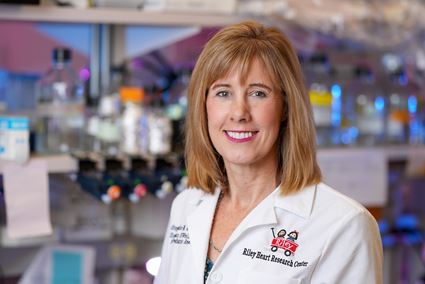 Ware’s colleagues describe her with words like “intelligent,” “dedicated” and “respectful.”
Ware’s colleagues describe her with words like “intelligent,” “dedicated” and “respectful.”
“She has demonstrated high scientific integrity and is an outstanding mentor to students and faculty,” Foroud said.
Matthew Durbin, MD, MS, a neonatologist and assistant professor of pediatrics, works with Ware on the Wells Center’s cardiovascular genetics team and appreciates learning from this world-class leader in the field.
“Dr. Ware is a dedicated and knowledgeable physician, scientist, educator and program leader who is passionate about her work,” Durbin said. “She always inspires and supports her team and leads through example.”
Geddes describes Ware’s approach to leadership as “thoughtful and wise.”
“Dr. Ware patiently listens to feedback from all sources with an open mind,” Geddes said. “She considers outside angles that involve the whole picture to ensure her ideas are as informed as possible.”
Ware doesn’t want to be one of those leaders with specialized expertise who hoards knowledge. She aims to build a learning system that continues to grow its impact through collaboration.
“I want to identify opportunities to increase collaboration with investigators and clinicians in other departments,” Ware said. “The integration of genomics into medicine is continuing to increase, and our department can help drive and facilitate that.”
Clapp calls Ware an “outstanding recruiter and program builder.” She has trained other physician scientists, strengthening the overall pediatric cardiology program, which is nationally ranked, he noted.
“She’s very intelligent, strategic, gracious and collaborative,” Clapp said. “She’s an excellent physician scientist who leads by example.”
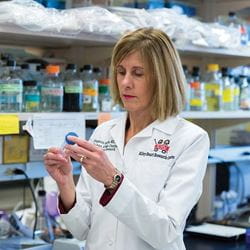
Women in Leadership at IU School of Medicine
Women are leading the way in helping Indiana University School of Medicine fulfill its mission to advance health in the state of Indiana and beyond by promoting innovation and excellence in education, research and patient care. The Women in Medicine series celebrates the contributions of women who have emerged as strong leaders within the medical school and in their respective fields of expertise.
